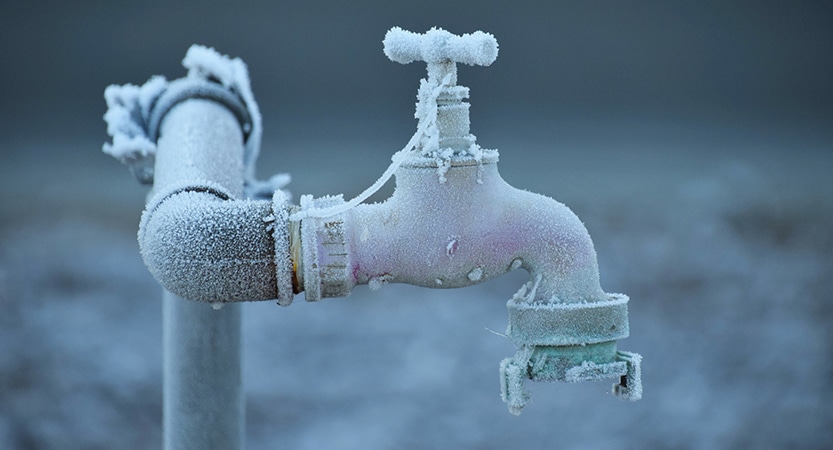Critical Strategies for Avoiding Frozen Pipes in Winter
Click HerePresented here below you will find a good deal of great details pertaining to Winter Plumbing Precautions: Preventing Frozen Pipes.

Cold weather can wreak havoc on your pipes, specifically by freezing pipes. Right here's just how to avoid it from taking place and what to do if it does.
Intro
As temperature levels decrease, the danger of icy pipes increases, potentially bring about pricey fixings and water damage. Recognizing just how to prevent icy pipes is crucial for home owners in cool environments.
Comprehending Frozen Pipes
What causes pipes to ice up?
Pipelines ice up when subjected to temperatures below 32 ° F (0 ° C) for prolonged periods. As water inside the pipelines freezes, it broadens, taxing the pipe walls and potentially causing them to burst.
Dangers and problems
Frozen pipes can result in water disruptions, residential property damage, and pricey repair work. Ruptured pipelines can flooding homes and trigger extensive architectural damage.
Signs of Frozen Pipes
Recognizing frozen pipes early can avoid them from rupturing.
Just how to determine icy pipes
Seek lowered water circulation from taps, unusual odors or sounds from pipelines, and noticeable frost on exposed pipes.
Avoidance Tips
Protecting vulnerable pipelines
Wrap pipelines in insulation sleeves or utilize heat tape to secure them from freezing temperatures. Concentrate on pipelines in unheated or exterior areas of the home.
Heating techniques
Maintain indoor rooms effectively heated up, especially locations with pipes. Open up cabinet doors to allow cozy air to circulate around pipelines under sinks.
Protecting Outside Pipes
Garden tubes and outside taps
Separate and drain yard hoses before winter season. Install frost-proof spigots or cover outdoor taps with protected caps.
What to Do If Your Pipelines Freeze
Immediate activities to take
If you suspect frozen pipelines, keep faucets available to relieve pressure as the ice melts. Utilize a hairdryer or towels taken in hot water to thaw pipelines gradually.
Long-Term Solutions
Structural modifications
Take into consideration rerouting pipelines far from exterior wall surfaces or unheated areas. Add extra insulation to attic rooms, basements, and crawl spaces.
Upgrading insulation
Buy high-grade insulation for pipes, attics, and wall surfaces. Appropriate insulation aids preserve regular temperature levels and minimizes the threat of icy pipes.
Verdict
Stopping icy pipelines requires proactive procedures and quick feedbacks. By recognizing the causes, indicators, and preventive measures, house owners can protect their pipes during winter.
Helpful Tips to Prevent Frozen Pipes this Winter
UNDERSTANDING THE BASICS: WHY PIPES FREEZE AND WHY IT’S A PROBLEM
Water freezing inside pipes is common during the winter months, but understanding why pipes freeze, and the potential problems it can cause is crucial in preventing such incidents. This section will delve into the basics of why pipes freeze and the associated problems that may arise.
THE SCIENCE BEHIND FROZEN PIPES
When water reaches freezing temperatures, it undergoes a physical transformation and solidifies into ice. This expansion of water as it freezes is the primary reason pipes can burst. As the water inside the pipe freezes, it expands, creating immense pressure on the walls. If the pressure becomes too great, the pipe can crack or rupture, leading to leaks and water damage.
FACTORS THAT CONTRIBUTE TO PIPE FREEZING
Low Temperatures: Extremely cold weather, especially below freezing, increases the risk of pipes freezing. Uninsulated or Poorly Insulated Pipes: Pipes located in unheated areas, such as basements, crawl spaces, or attics, are more prone to freezing. Insufficient insulation or lack of insulation altogether exacerbates the problem. Exterior Wall Exposure: Pipes running along exterior walls are susceptible to freezing as they encounter colder temperatures outside. Lack of Heating or Temperature Regulation: Inadequate heating or inconsistent temperature control in your home can contribute to frozen pipes. PROBLEMS CAUSED BY FROZEN PIPES
- Pipe Bursting: As mentioned earlier, the expansion of water as it freezes can cause pipes to burst, resulting in significant water damage.
- Water Damage: When pipes burst, it can lead to flooding and water damage to your property, including walls, ceilings, flooring, and personal belongings.
- Structural Damage: Prolonged exposure to water from burst pipes can compromise the structural integrity of your home, leading to costly repairs.
- Mold and Mildew Growth: Excess moisture from water damage can create a favorable environment for mold and mildew growth, posing health risks to occupants.
- Disrupted Water Supply: Frozen pipes can also result in a complete or partial loss of water supply until the issue is resolved.
WHY CERTAIN PIPES ARE MORE PRONE TO FREEZING
- Location: Pipes located in unheated or poorly insulated areas, such as basements, crawl spaces, attics, or exterior walls, are at higher risk of freezing.
- Exterior Pipes: Outdoor pipes, such as those used for irrigation or exposed plumbing, are particularly vulnerable to freezing as they are directly exposed to the elements.
- Supply Lines: Pipes that carry water from the main water supply into your home, including the main water line, are critical to protect as freezing in these lines can affect your entire plumbing system.
- Underground Pipes: Pipes buried underground, such as those connected to sprinkler systems or outdoor faucets, can be susceptible to freezing if not properly insulated.
https://busybusy.com/blog/helpful-tips-to-prevent-frozen-pipes-this-winter/
:strip_icc()/snow-outdoor-faucet-pipes-4af65d1e5e904fb1aa7bf74071fe5d89.jpg)
As a passionate person who reads on Prevent Frozen Pipes , I think sharing that excerpt was a great idea. If you enjoyed reading our blog posting if you please do not forget to share it. Kudos for being here. Please check up our website back soon.
Book